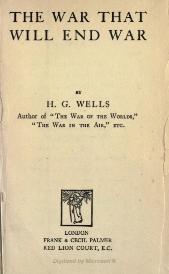
"The war to end war" (also "The war to end all wars";[1] originally from the 1914 book The War That Will End War by H. G. Wells) is a term for the First World War of 1914–1918. Originally an idealistic slogan, it is now mainly used sardonically,[2] since not only was the First World War not history's final war, but its aftermath also indirectly contributed to the outbreak of the even more devastating Second World War.
YouTube Encyclopedic
-
1/3Views:9 363 3511 013 01280 032
-
The War To End War: Why WWI Was Thought To Be The Last | Great War In Numbers | Timeline
-
The First World War: The War to End War | WW1 Documentary
-
The End of the War to End All Wars – The Great War – Sabaton History 080 [Official]
Transcription
Origin
During August 1914, immediately after the outbreak of the war, English author and social commentator H. G. Wells published a number of articles in London newspapers that subsequently appeared as a book entitled The War That Will End War.[3] He blamed the Central Powers for starting the war and argued that only the defeat of German militarism could bring about an end.[4] He used the shorter form, "the war to end war", for In the Fourth Year (1918), in which he noted that the phrase "got into circulation" in the second half of 1914.[5] It became one of the most common catchphrases of the First World War.[4]
Later use
During the First World War, the phrase met with some degree of skepticism. As it became apparent that the war had not succeeded in ending war, the phrase took on a more cynical tone. The British staff officer Archibald Wavell, a future field marshal and viceroy of India, said despondently of the Paris Peace Conference, "After the 'war to end war', they seem to have been pretty successful in Paris at making the 'Peace to end Peace'."[6] Wells himself used the phrase in an ironic way in the novel The Bulpington of Blup (1932).[7] Walter Lippmann in 1967 noted, "The delusion is that whatever war we are fighting is the war to end war", while U.S. President Richard Nixon in his "Silent Majority" speech (1969) said, "I do not tell you that the war in Vietnam is the war to end wars".[2]
Since at least the last third of the 20th century, the alternative wording "the war to end all wars" has increasingly become popular. "The War to End All Wars" has been used by authors such as Edward M. Coffman (1968), Russell Freedman (2010) and Adam Hochschild (2011).[8][9][10]
See also
References
- ^ The war to end all wars BBC News 10 November 1998.
- ^ a b Safire, William (2008). Safire's Political Dictionary. Oxford University Press US. pp. 792–3. ISBN 978-0-19-534334-2. Retrieved 2010-08-24.
- ^ Wagar, W. Warren (2004). H.G. Wells: Traversing Time. Wesleyan University Press. p. 147. ISBN 978-0-8195-6725-3. Retrieved 2010-08-24.
- ^ a b Rempel, Richard A., ed. (2003). The Collected Papers of Bertrand Russell. Routledge. p. 10. ISBN 978-0-415-10463-0. Retrieved 2010-08-24.
- ^ Wells, H. G. (2008). Short Works of Herbert George Wells. BiblioBazaar, LLC. pp. 13–14. ISBN 978-1-4375-2652-3. Retrieved 2010-08-24.
- ^ Pagden, Anthony (2008). Worlds at War: The 2,500-year Struggle between East and West. Oxford University Press US. p. 407. ISBN 978-0-19-923743-2. Retrieved 2010-08-24.
- ^ Wells, H. G. (1932). The Bulpington of Blup. pp. 161, 163, 173. ISBN 9781409725664. Retrieved 2010-08-24.
- ^ Coffman, Edward M. (1968). The War to End All Wars: The American Military Experience in World War I. Oxford University Press. Retrieved 8 December 2018.
- ^ Freedman, Russell (2010). The War to End All Wars: World War I. Clarion Books. ISBN 978-0547026862. Retrieved 8 December 2018.
- ^ Hochschild, Adam (2011). To End All Wars: A Story of Loyalty and Rebellion, 1914-1918. Houghton, Mifflin, Harcourt. ISBN 978-0547549217. Retrieved 8 December 2018.
External links
- H. G. Wells, The War That Will End War on the Internet Archive
